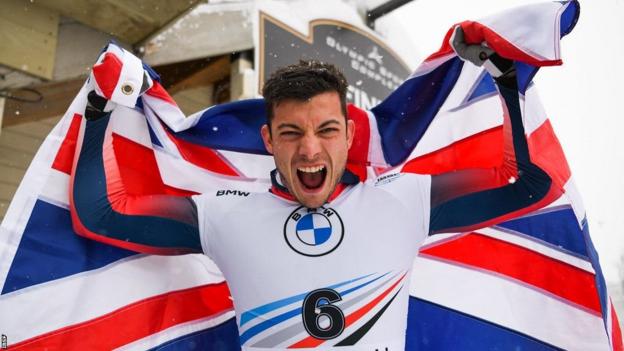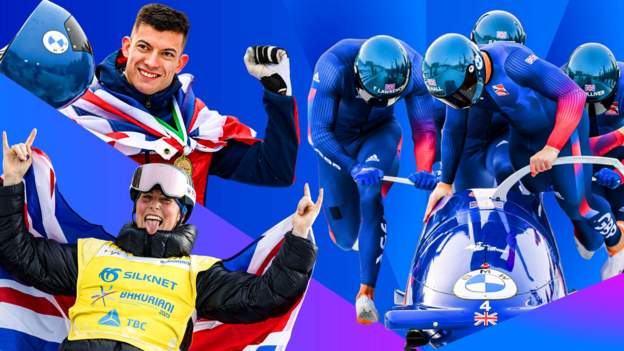Vicky Gosling was crossing a road, coffee in hand, when the magnitude of achievement dawned on her.
“That’s it, the full house,” GB Snowsport’s chief executive thought.
She had just learned of Ollie Davies’ ski cross World Cup silver. A medal which meant that, in this season alone, Great Britain had reached the podium in every World Cup discipline it competes in on snow.
Yes – Great Britain. That green and pleasant land with no world-class snow sport facilities to speak of. Nor a sliding centre for bobsleigh and skeleton, or a 400m ice track for speed skating.
But what it does have is world-class winter athletes – and they have reaped the rewards for their resilience this season.
Britain’s athletes in snow sports, bobsleigh and skeleton alone – across both able-bodied and para disciplines – have won almost 80 medals at World Championships and World Cups during the 2022-23 campaign, plus a whole host of Crystal Globes and other overall medals for the season.
History has been made every which way you look, including European silver and a number one world ranking for ice dance pair Lewis Gibson and Lilah Fear, and a long track speed skating world bronze for Cornelius Kersten.
Winter sports and Great Britain are not words that have traditionally been uttered in the same sentence. But times, perhaps, are changing.
“These Brits with grit have got what it takes when you really challenge them,” Gosling told BBC Sport.
“We needed this boost, and we needed to effectively get the support of the nation back behind us and have a little bit more confidence in the fact that we can do winter sports well and we can do it on that world class stage and compete with the very best in the world.
“Everybody wants a feel good factor, particularly when you look around us at the moment and everything’s coming as a crisis to Britain. But when you look at some of the great wins that we’ve had and the narrative behind it, it’s extraordinary.”
‘We came back fighting’
Little more than 12 months ago, it was a very different story. Despite a target of three to seven medals, Team GB were left to “lick their wounds” after a Beijing Olympics that had promised so much success and yet fell short on delivery, just two curling medals – won on the last two days of competition – to show for an Games of upsets and near-misses.
GB Snowsport, Gosling says, had headed to China with a “slight arrogance” they were going to over-deliver. They had good reason to think that too, with a world champion on their books in Charlotte Bankes and the historic alpine skiing World Cup gold for Dave Ryding just weeks before.
But then came the “day-after-day disappointment” as everything “fell apart”. Bankes crashed out in the snowboard cross quarter-finals, Ryding finished 13th in the slalom, while freestyle skier Kirsty Muir was the highest-placed Briton on snow, fifth in the big air.
Blame was laid at the door of the challenges posed to Britain’s athletes in particular by Brexit and Covid, as well as the austere conditions all Games attendees had to live under in Beijing.
“I think the reality is we still had brilliant, talented athletes going into Beijing, but I don’t think we had the best preparation and plans in place before we went in,” said Gosling.
It prompted “significant reflection” within the governing body, yet the blows didn’t stop there. When UK Sport announced its funding for the 2026 Milan-Cortina cycle, a “disappointed” GB Snowsport had its investment slashed from just over £14m for the Beijing cycle, to £12.2m.
With quite the statement of 50 World Championship, World Cup and X Games medals since – including six consecutive World Cup wins for Bankes and 16-year-old Mia Brookes, who was too young to compete in Beijing, becoming the youngest world champion in snowboarding history – Gosling hopes UK Sport have “got some confidence back” in what GB Snowsport can achieve.
“There’s nothing better than serious failure to teach you some good lessons in life,” said Gosling, a former Group Captain in the RAF who was chief executive of Invictus Games.
“It’s painful, but you learn an awful lot. And then you get back on the horse. I think it recalibrated everybody and refocused the mind into what do we need to do to really build on what we’d originally built, and take it to the next level.”
She added: “I think our resilience was really built during that period of Brexit, Covid and then the results of Beijing. We took a huge funding cut across the organisation and then came back fighting. To see what the athletes have achieved has been out of this world.”
And so to that target that Gosling set when she joined GB Snowsport in 2018 – for GB to become a top five snow sport nation by 2030. It was a statement that was perhaps balked at, how could GB – the land of limited snowy pistes and Eddie the Eagle – hope to compete with the likes of the Scandinavians, Austrians, Swiss and the North Americans? This season’s results may have changed that view.
“I think you have to set your ambitions high and have a really strong vision that people can get behind in order to even have a fighting chance of getting there,” she said.
“And when you look across the strength and depth in terms of the medal tally that we’ve already got, all the different disciplines are performing. That makes that vision become far more achievable.”
From ‘terrible Beijing’ to ‘statement season’
For the 2026 Milan-Cortina Winter Olympic and Paralympic cycles, UK Sport has invested a combined £29.5m as it hopes for GB to become an “ever greater force in winter sport”.
As part of that, bobsleigh saw its funding increase from £120,000 to £1.9m, an exponential rise that took “a lot of the pressure off”, according to pilot Brad Hall, ending the need for self-funding and rented sleds, and bringing in a new performance director and head coach.
At the Olympics, Hall piloted the four-man and two-man sleds to sixth and 11th respectively. This season, he has led GB to 11 World Cup medals across both sleds, as well as silver at the World Championships – Britain’s first four-man bobsleigh world medal for 84 years.
“Success has come from that combination of allowing an already high-performing team to concentrate solely on high performance, while bringing in a couple of bits of knowledge that helps to improve performance further,” new head coach Graham Richardson told BBC Sport. “That is really all they needed.”
But skeleton was handed a £1.7m funding cut – down from the £6.4m for the Beijing cycle – after failing to win a medal for the first time since the sport was reinstated to the Olympic programme in 2002.
Matt Weston finished 15th at the Olympics, and considered quitting the sport in the aftermath. But the recruitment of a new coach – Latvian Olympic and world medallist Martins Dukurs, who is widely regarded as the greatest slider in skeleton history – and sled builder Mattias Guggenberger for the 2022-23 season brought immediate change.
Weston started the season lacking “full confidence” in himself, but ended it as world champion – the first British man to achieve this in 15 years – and with overall World Cup silver, team-mate Marcus Wyatt just behind him on the overall podium with bronze.
“It’s made a massive difference for us. I think it’s allowed not just me, but all of the team, to be able to reach their full potential,” the 25-year-old told BBC Sport.
“It’s a big change, but a very, very good one. I think it opens the door for a lot more success in the future.”

In the aftermath of Beijing, questions were raised over GB’s equipment, and while Weston refuses to say whether they ever got to the bottom of the issues, he says they “learned a hell of a lot” from the experience.
“Without [Beijing] being as terrible as it was, really, I don’t think we would have had the year we’ve had this year,” he said.
“If you look at our history as British Skeleton, we’ve always been extremely successful, won a medal at every single Games apart from the last one. It’s almost like a blip in our history.
“[This season] is a bit of a statement, and it just goes to show you should never lose trust in what us as a sport can do because we are one of the most dominant in the world at what we do.”
So, with three years to go until the next Winter Olympics, on a more familiar time zone in Milan-Cortina, with no restrictions and the time to become the “fully polished product”, how is Weston feeling about the next Games?
“I’m excited already”.


